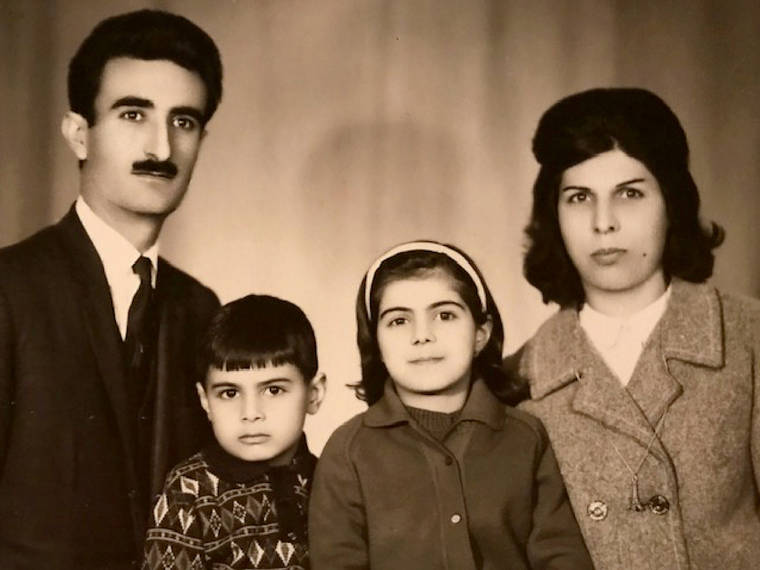Americans helped my family emigrate from Iran. That kindness is what makes this country great

A family portrait of Hassan, Behrooz, Sholeh, and Farideh Moghaddam, taken in Iran in 1967. Two years later the Moghaddam family immigrated to the United States where they are now citizens. (Courtesy of the Moghaddam family/TNS)
My first taste of American greatness was peanut butter.
My first taste of American greatness was peanut butter.
It was in 1965 or so, in Urmia, my hometown in northwest Iran. I was around 3 years old. The peanut butter was a gift from Penny and Richard, two of a handful of Peace Corps volunteers who worked in Urmia in the 1960s. Since President Donald Trump was elected, I have thought a lot about that gift of peanut butter and our president’s slogan, “Make America Great Again.”
ADVERTISING
Had Trump’s policies existed when I was a child, I would not be who or what I am. My immigrant family would have failed our president’s admission test on all possible counts. We were poor, only one of us spoke passable English when we arrived in the U.S., and we were from a Muslim country. Thankfully, in 1969, and at least until four years ago, America saw itself and the rest of the world very differently than the president does.
In Iran my father was a schoolteacher. Several Peace Corps volunteers taught English classes at his school, and he was assigned to assist them. Little did he know how handsomely they would repay him for the free Farsi lessons he would give them.
About a year after my father befriended the volunteers, we were invited to dinner at one of their homes. After we ate, they produced a letter from an American organization dedicated to cross-cultural exchanges. Knowing that my father wanted to attend university in the U.S., his friends had applied to the program on his behalf, and he had been accepted to the 1967 summer exchange. Then the young Americans brought a cooking pot to the table and turned it upside down. Out poured a small mountain of money — for the Farsi lessons — which he would use to cover expenses during his trip.
That was just the first act of generosity that Americans would extend my family. Two years later, back in Iran, another Peace Corps volunteer, Jim, would go with us to the U.S. Consulate in Tabriz to help us apply for visas so that my father could study in the United States. While we waited in Tabriz, the consul general invited us to tea and promptly approved the applications.
In June 1969, with $600 to our name, my parents, my sister and I arrived in New York. We spent our first two months in the U.S. with George, Marjorie and their four children, in Bedford Hills, New York, a family that had hosted my father during his 1967 visit.
It was a summer of firsts for me — tractor rides, canoeing, blueberry pie. We all sat together and watched the grainy television images of the moon landing. There was no “America first” in Neil Armstrong’s iconic words, but with “one small step” he exemplified real American greatness.
When we left Bedford Hills for Texas — where my father would start pre-engineering courses at Blinn College — George and Marjorie surprised us with a check for $1,000. Larry, a Peace Corps alumnus, helped my father register at school and find a home to rent in Brenham, Texas — famous for its bluebonnets and Blue Bell ice cream. Time and again the people of rural Brenham showed us charity in ways big and small. I threw my first baseball there, opened my first Christmas gift.
I think back now and marvel at how far an Iranian boy and his family have come. My father eventually got his civil engineering degree at Texas A&M, and later his Ph.D. in environmental design. My mother, whose father had denied her an education beyond the sixth grade in Iran, never let her children forget that in America we could become anything we wanted. My sister earned a Bachelor of Science and a master’s degree and worked in health care management. She married another immigrant; their Iranian Indian American children are well into their own careers. I have a successful career as a lawyer in Los Angeles. We all became naturalized citizens around 30 years ago.
What President Trump doesn’t understand about American greatness is that, at its heart, it has always been about this nation’s open arms — as imperfect and inconsistent as that embrace may be at any given moment. And immigrant families such as my own, in return, have gratefully become part of the American fabric — through our labor, ingenuity, optimism and love of democracy.
Thank you, Penny and Richard. Thank you, Jim. Thank you, George and Marjorie. Thank you, Larry. Thank you, Brenham. Thank you for your humanity, your charity, your grace. Thank you for making America great.
Behrooz Alexander Moghaddam is an attorney in Los Angeles.


